
 |
Backward Glances
|
REMINISCENCES OF EARLY DAYS IN THIS SETTLEMENT By Mrs. Catherine Cameron In the early days of this century the West claimed many settlers from the land called Bruce, and "the men from Bruce" became a password. So much so, in fact, that the story is told of the occasion on which a Chinese arriving in Moosejaw from Winnipeg, in search he explained, "Me from Bruce!" Yes, "the men from Bruce" had a reputation in those days, and a quotation from "An Ode to Bruce County," as read to an old time gathering in Vancouver, on Jan 31, 1924, carries it out: "A land that is known to the end of the earth, I look back and I see the old frame Presbyterian Church on the hill where the United Church manse now stands, and filled to the doors with grand old pioneers. I can name the greater number of them yet. Men and women of sterling quality, deep and abiding; faith, a firm belief in God and a reverence for the service of His house and the keeping of the Sabbath day that seems to have gone with their passing. Why is this, I wonder? The land that is Bruce today bears silent testimony to the energy and resourcefulness of the pathfinders and pioneers of that dav. A pine knot, a tallow dip or a candle were all the light many of them had, but in the long winter evenings these served to get an education by, and the boys so educated because the founders of the best we have from an educational point of view. School days were, to one small scholar, a delight, especially when James Saunders, the teacher, with the pointer in one hand, a book in the other, called the fifth class up for lessons. He would declaim poetry and prose, striving so earnestly to impress on his pupils the correct reading and recitation, a real gift to carry through life, a source of great enjoyment to one's self and to others. Sitting here and thinking over the changes time has made, I wonder how many are remaining to remember the 24th of May, 1868? 1 am not sure, but I think it was the first national celebration of the birth day of Queen Victoria, and Paisley was staging a "big day." The posters were up, setting forth the day's attractions, but the word 'calithumpian' at the head of each bill was a puzzle to us all. What are they? Where do they come from? What will they do? And none could give an answer. The day dawned beautifully, as May days are always supposed too, and we were abroad early, dressed in our best and greatly excited over the coming events of the day and especially, those 'calithumpians!' What a time we had, darting from one corner of the street to another, seeking the best point of vantage from which to view the parade. At last the flag appeared, and to the tune of the fife and drum, the march began. And of all the wildest looking band of men, with false faces and hats made of cardboard and painted all colors, and the raggedest clothing they could find. "Calithumpians!" I don't know what we really expected to see, but I do remember our disappointment and our dislike, for their chief object seemed to be to chase the children and frighten them half to death. My memory fails to recall other events of the day, but we never did forget the "'thumpians." Ah, those days of long ago! The memories of the past lie there among our souvenirs. Ah, Paisley! Your touching appeal, "Will ye no come back?" deserves a great response from all parts of this wide domain. Here's wishing you many glad and happy re-unions. My one regret is that advancing years forbids my joining the trek back home.
|
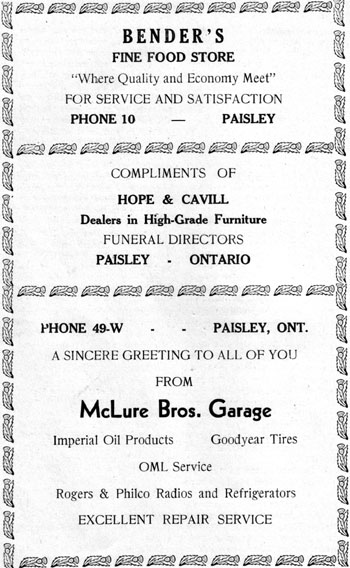 |
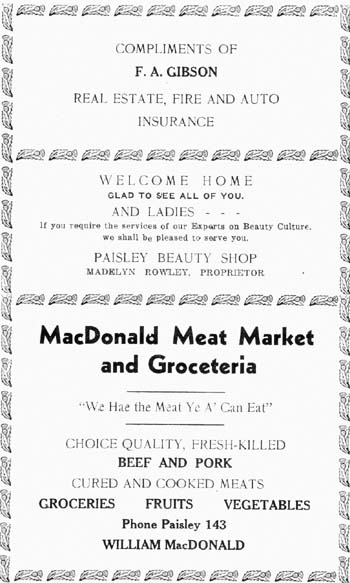 |
PAISLEY FIRST CIRCUS By W. H. REED One of the outstanding memories I retain of the year 1874 is being taken to the first circus I ever saw. In that year and in a locale like Paisley, the possibilities of a large attendance at such a performance did not exist. No great free street parade, including elephants, camels, zebras, horses, bands, clowns, caged wild animals, and a calliope playing "There'll Be a Hot Time in the Old Town Tonight," etc., as of later years. No indeed As I remember it now, after 75 years, the circus organization had only one tent and one wild animal, a pachydermous quadruped of Africa, a rhinoceros. It was chained to the centre pole of the tent. The grounds, in those days, were known as "Thompson's Flats," and were located on the north bank of the Willow Creek, west of Laidlaw's foundry. I have no recollection of any band, high-wire acts, clowns, peanuts, popcorn or pop. The incident that follows is my one and only recollection of that evening. My aunt Maggie Scoffield, later Mrs. Moffat of Cargill, was being escorted to the circus by Matt Daniels, who at that time worked in my father's shop, and I was included in the party. We had seats in the top tier of the limited accommodation provided. It was neither high nor luxurious. A panic was created when the rhinoceros presumably broke loose from the pole, and there was a stampede for the one exit. Below us on the bottom tier sat Mrs. G. W. Malloch. She had her black silk dress and hoop skirt torn by the horn of the rhinoceros, or so I was told. In the moment of excitement, Matt Daniels grabbed me and dropped me to the ground against the canvas. Aunt Maggie and he followed by the same route, and we made our exit by ducking under the lower edge of the tent, and avoided the jam of the rush for the lone exit. We learned afterward that this incident was created with intent by the employees of the circus with full approval of the management, in order to give the pickpockets an opportunity to reap a harvest. Several of those who attended the performance afterward reported the loss of their wallets during the jam at the exit.
|
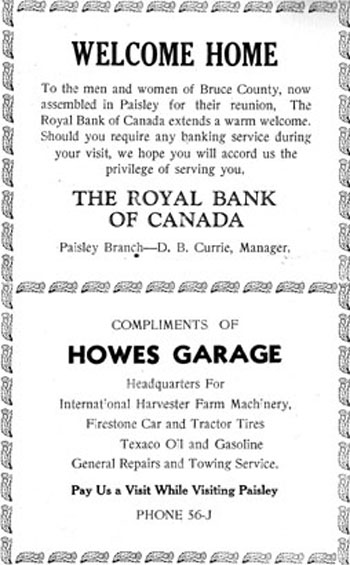 |
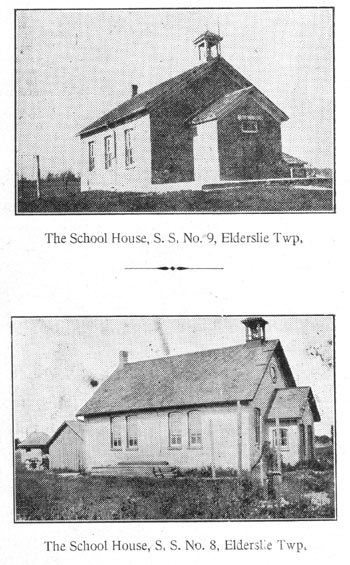 |
"BACKWARD GLANCES" Brief bits of reminiscences by Archie Fisher There. is no doubt that nostalgia, is a disease. It arises from a positive affection for the past and for tradition. At this time, when the sympathies of the Bruce Old Boys lie very acute as they return to the beloved birthplace, let us ramble a bit into the realm of the fantastic past. We shall learn of the yearn to revisit Paisley, and perhaps find the reason therefor, in the fact that the natives of this century-old village have actually experienced two distinct ways of life. It would be foolish to attempt an adequate comparison between the last half of the 19th century and the first half of the 20th, so that remembrances, keepsakes & souvenirs of those who peopled Bruce in the 50's and 60's, and their progeny, all tell about a world long ended. The mirage of those years, spread between the, American Civil War and the coming of pictures and auto, can scarcely be credited, in spite of the fact that places in this county will be eternally wrapped up in the harried epic of the continent. That Paisley, as a centre, did contribute uniquely, is quite true; and it surely still retains irs niche in historical romance, to be sketched, some time, and soon, for here the pioneers were terrific. Not only did they build Bruce, and educate a family, out of 100 acres or so. but they pushed out to the Manitoba prairies, the Cariboo district of British Columbia and the Klondike, to help build the Winnipegs, the Vancouvers and the Dawson Citys. They certainly believed in the ties of Empire, followed the sun and, with their boys and girls, told the fairy tales and folklore of hard work, hard shirts and hard liquor in Bruce, yes, up and down and all over the Pacific West. It is, perhaps, unfortunate that the grandchildren of the Paisley pioneers are quite unaware of the private pursuits, in pleasure, contemplation and experiences of their forbears; for those were times of romance and rioting indeed, of roast goose and revelry, horsewhips and parasols, whiskers and whisky, longboots and lovely ladies, Caledonian Games, lacrossc matches, socials and tea meetings. And no matter how often or how carefully the tale is told, it could never give a true picture of those flickering old oillamps in the town and township halls; the social fellowship heightened by mutability of feeling, dispensed by the box stoves as their firelight fell on those happy, laughing faces. And the old boys and girls will tell you of the "glow" of the base-burner or the old coal stove at those country house parties, or the supreme joy of those moonlight sleigh rides up and down those, hazardous hills. Ah, but it was fun to be in Paisley in those days. Come change, come chance, there are things that abide. The streams, that embrace Paisley, will forever glide. The pioneers built their hamlet on the banks of the Teeswater, the Saugeen, the Willow Creek. The natural beauty of the valley, as one can see today, was wild and astounding; and although it was necessary to fell handsome trees to make way for streets and homes, the newcomers early added their industry, to provide spacious lawns, great flower beds and orchards and strange and exotic shrubs. The brave women and noble men who fitted so well into the way of life they created out of the dense bush almost 100 years ago, seemed to have their whole faith in thought and the exercise of the senses, for there was not the sligh!est smack of regimentation, nor a mite of supervision over the lives of the early inhabitants of the Paisley district. Individuality sprouted a gorgeous garden, from the, top of Goldie Street the .............
were, a brilliant family whose members scattered to literary and musical positions in American cities to the brow of Greenock hill, where, the homesteads of the McMorrans and the Andersons looked over a flowery kingdom, as far as Ellengowan. And in that pretty picture was included, of course
the main street of the village, running from Hog's Back to the Anstead Hotel at the Grand Trunk station. In this lovely setting, homes were made elegant, and entertainment was of high caliber, for the pioneers handed to their sons and daughters the best in educational training, as well as teaching them their place as citizens in the growing municipality In this connection, old timers may recollect the small frame post office, when Mrs. Saunders was postmistress assisted in turn by her four talented daughters, Mrs. Sutherland, Mrs. Hutcthison, Mrs. Laidlaw and Mrs. Allen. It was the Victoria Strret residence of the Saunders which gave the venerable photographer, T. B. Head, excellent shots for his horticultural papers, but he also made superb pictures of the floral arrangements, at the Barries, the Bains, the Sinclairs, the Pinkertons and the Grants. From the four-foot plank sidewalks in the north end, it was quite easy to make plates of the beauty spots where lived the Reeds, the Clarks, the Rusks, the McKcchnies and the Briggs. In this "individual" keynote of daily action lay the priceless panacea for the pleasurable prolougation of peaceful living, which the returning old boys and girls will remember as the lot of their pioncer parents. It may be that some of the oldtimers who are absent from the big re-union in July, 1948 will easily recall the Wilson House (the Grand Central Hotel of today). This Inn flourished in the 1880's and was noted far and wide for it's cuisine and general splendid services. It had spacious yards with a big pump at the side and from which fa:mers from the four townships carried water to their teams as they parted with their loads of grain, meat and wood to busy builders on market days. It also provided room for the buggies and phaetons of travelling minstrels, who came to put on their blackface and banjo playing shows while selling patent medicines to enthusiastic crowds. Who could forget "Cheap John"? He sold all sorts of novelties; would pile his arm high with ties, red handkerchiefs, rings, brooches, etc., etc., and sell the whole lot for one dollar - with two packages of lead pencils thrown in on tho deal. On such nights, the jewelry store of Wesley Black would be open to care for "time-pieces"; he was popular as an expert watchmaker. But it was Bob Cruishank, hustling people from the hotels to the railway station in his big, yellow bus, who was a beloved character. There were three trains each way each day way back them, and Bob was on the box high above the bus, and much to the delight of small boys chancing a high-up ride with him. It was a 20-hour-a-day job, from early morning til the midnight train, which was usually late. Often Bob was rrquired to return to the station after he had driven a large load to the downtown hotels. It was a hard life. In the last quarter of the 19th cantury, the place of the tavern in the community life of Bruce was essential to the proper conduct of the commercial and municipal business. The proprietor of these public houses was, generally speahing, a citizen of wisdom, and he played a prominent role in the
social life of the, growing towns, and villages, providing banquets, dinners, lunches, as well as providing political and religious headquarters for sojourning pilgrims. The pioneers had to have accommodation for their horse, on the Sabbath, for they were faithful and constant church-goers, so they flocked to the hotel stables. Paisley was not behind in this type of high-class accommodation, and in the 80's boasted seven hotels, all well prepared to look after over-night guests. At the same time, there were two licensed Liquor stores in the village. One was operated by Donald Fraser, and the other by George Campbell. Miss Lizzie Fraser was one of Paisley's popular young ladies at that time. The Anstead Hotel opposite the G.T.R. station, and George's Hotel, down by Starks mill, were not too profitable for Bob Cruickshank, the bus man, but all day long the yellow coveyance he drove would be calling at thc Royal Hotel, then operated by William Dekker, and the McClure's Hotel, a Scotsman's house well liked by the farmers while at the north end of town, the Hanna House and the Northern Hotel catered to thc commercial trade. All of these Hostleries were, furnished carefully and cosily, and the drinking bars were mirrored and quite dazzling. There was a good deal of entertaining during the Christmas month, and the period was a joyous time for all the village families, with guests coming from long distances, and many returning from the cities for the festive vacation.
|
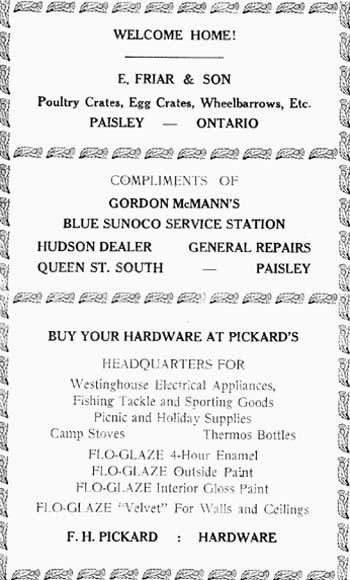 |
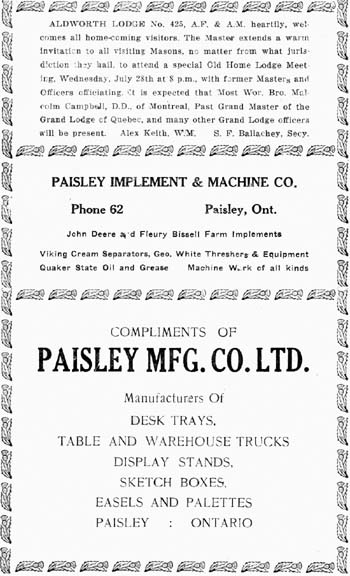 |
| Return to top of Page | Return to top of Page |